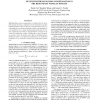Free Online Productivity Tools
i2Speak
i2Symbol
i2OCR
iTex2Img
iWeb2Print
iWeb2Shot
i2Type
iPdf2Split
iPdf2Merge
i2Bopomofo
i2Arabic
i2Style
i2Image
i2PDF
iLatex2Rtf
Sci2ools
126
Voted
ICIP
2003
IEEE
2003
IEEE
Multihypothesis motion compensation in the redundant wavelet domain
Multihypothesis motion compensation is extended into the transform domain by using a redundant wavelet transform to produce multiple predictions that are diverse in transform phase. The corresponding inverse transform implicitly combines the multihypothesis predictions into a single spatial-domain prediction for motion compensation such that no side information is needed to describe the combination weights. Additionally, we use a hierarchical search to tailor the motion-vector field to individual phases. Substantial gains in rate-distortion performance are obtained in comparison to an equivalent system using single-phase prediction.
Corresponding Inverse Transform | ICIP 2003 | Image Processing | Motion Compensation | Redundant Wavelet Transform | Transform Domain | Transform Phase |
Related Content
| Added | 24 Oct 2009 |
| Updated | 24 Oct 2009 |
| Type | Conference |
| Year | 2003 |
| Where | ICIP |
| Authors | Suxia Cui, Yonghui Wang, James E. Fowler |
Comments (0)

